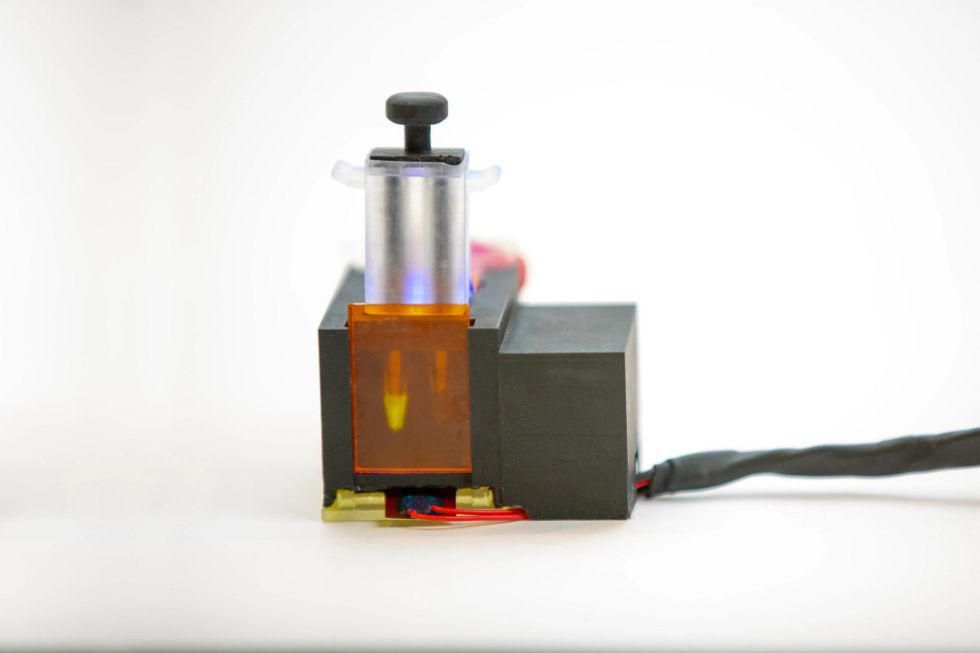FRIDAY, Aug. 6, 2021 (HealthDay News) — Spit and scan. That’s all you have to do, and in less than an hour, you can not only find out if you have COVID-19 but what variant you have, all without leaving your home.
This is the hope and promise of a new saliva-based COVID-19 test that is currently under development.
“Several at-home tests are available for telling you whether you have COVID-19, but none of them test for variants,” said study author Dr. Xiao Tan, a clinical fellow at the Wyss Institute for Biologically Inspired Engineering at Harvard University, in Boston.
There are no plans to commercialize the test yet, but a new proof-of-concept study shows that the technology works as well as the gold standard PCR tests and could cost as little as $3 per test, which is a lot cheaper than currently available COVID-19 home tests.
The test, called Minimally Instrumented SHERLOCK (miSHERLOCK), is based on CRISPR gene-targeting technology. It only requires off-the-shelf chemical agents, a 3D printer and commonly available equipment.
By contrast, COVID-19 tests based on PCR technology require highly specialized equipment and can take roughly four hours for results. If a sample were to be tested for a specific variant using PCR technology, it would have to be genetically sequenced, which takes even more time and resources, Tan explained.
There are currently several at-home COVID-19 tests available. Some tests require samples be sent to a lab for analysis, while others provide results at home using various technologies such as test cards and processing fluid. No PCR tests can be processed at home.
So, researchers at the Wyss Institute, the Massachusetts Institute of Technology (MIT), and several Boston-area hospitals collaborated to develop the new test.
For the study, the researchers tested saliva samples from 27 people with COVID-19 and 21 people without the virus. The test identified the virus about 96% of the time, which is on par with the PCR tests. What’s more, the test detected three different variants of COVID-19: the United Kingdom, South African, and Brazilian variants.
The study was conducted before the Delta variant began widely circulating so it did not look for this strain, but the technology can be rapidly tweaked to detect additional variants, the researchers noted.
“Theoretically, you could find out you are positive for COVID-19, but negative for Delta all at once,” Tan said.
The test could also be used in areas that don’t have access to genetic sequencing facilities, said study author Dr. Rose Lee, an instructor in pediatrics at Boston Children’s Hospital.
How it works
The new test is a simple battery-powered device comprising two chambers: a heated sample prep chamber, and an unheated reaction chamber, Tan explained. A user spits into the sample prep chamber, turns up the heat, and waits three to six minutes for the saliva to be wicked into a filter.
Next, you remove the filter and transfer it to the reaction chamber. “The virus is the key that unlocks the signal,” Tan said. “If there is no virus, there is no signal, but if there is a signal, it can be amplified.”
The results are easy to interpret. “If it glows green, you have COVID-19,” Tan said.
There’s one chamber for universal COVID-19 detection and others that can be added to test for variants. “We are imagining a health authority would pick the variants that are most relevant in the area,” he said.
An accompanying app helps quantify the sample if the viral load is low and also provides an option to report the results, Tan said.
The study was published online Aug. 6 in the journal Science Advances.
Experts not involved with the study said that many questions remain about what role this type of test may play in the ongoing pandemic.
“This is the first point-of-care test that can determine variants, and it can be adapted for other kinds of variants as they emerge,” said Dr. Jeffrey SoRelle, a pathologist at the University of Texas Southwestern Medical Center, in Dallas. “There is no difference in management based on the variant, but it is possible there may be a variant that will require us to change our treatment in the future.”
Dr. Heba Mostafa, an assistant professor of pathology and director of the molecular virology lab at Johns Hopkins Medicine in Baltimore, agreed. “The question is how valuable it is to have a point-of-care test that targets a specific variant, and the answer is not clear because variants are not actionable for patient management,” she said.
Such information is more useful on a larger scale to better track mutations as they spread across the globe, Mostafa added.
More information
Visit the U.S. Centers for Disease Control and Prevention for more on COVID variants.
SOURCES: Xiao Tan, MD, PhD, clinical fellow, Wyss Institute for Biologically Inspired Engineering, Harvard University, Boston; Rose Lee, MD, pediatric infectious disease specialist, Boston Children’s Hospital; Jeffrey SoRelle, MD, pathologist, University of Texas Southwestern Medical Center, Dallas; Heba Mostafa, MD, PhD, assistant professor, pathology, director, molecular virology lab, Johns Hopkins Medicine, Baltimore; Science Advances, Aug. 6, 2021, online
Copyright © 2026 HealthDay. All rights reserved.

